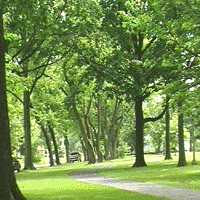Community Asset Program Stresses Finding Resources Close to Home
Community Asset Program Stresses Finding Resources Close to Home

Published on February 9, 2000
As legislators meet in Frankfort for their biennial session, hundreds of community and institution leaders are vying for their piece of the limited fiscal pie.
Even in the best of times, the pot is never full enough for the hundreds of small and large projects that need funding.
Lori Garkovich, a community development specialist in the UK College of Agriculture, thinks many communities are looking for help in the wrong place.
"We need to focus on building community resources with available local talent, time and expertise," said Garkovich. "It all boils down to self- reliance and communities investing in themselves."
To foster this concept, Garkovich has been taking a program to various community groups called "Building Community Assets."
The program focuses on helping civic leaders identify the resources within their community and then bringing them to bear on popular needs or issues through the relationships within that community.
Garkovich says she is a small part of a much larger movement. Most of the meetings she conducts are set up by county Cooperative Extension agents who have long been known as "agents of change" in their communities.
"It is my goal to train them and lead them through the process of asset building and then work myself out of a job!" said Garkovich. "I will not write the community vision for them, it is only meaningful if they do it themselves."
The program basically guides community groups through three different levels of self examination.
"We start by getting an inventory of community expertise from the individual level," said Garkovich. "Everyone has talents, regardless of age, education or work experience."
"When push comes to shove, the only people who really care about a community need or issue are those that live within the community." stressed Garkovich. "They are the only ones who may be willing to put themselves on the line for their friends and neighbors and give of themselves."
The second level inquiry is to identify potential assistance from community organizations or businesses such as neighborhood associations, the Chamber of Commerce, or civic groups like Kiwanis and Rotary .
"Groups such as this can provide expertise on how to get things done, because many have been there," said Garkovich. "Some also have valuable linkages to the outside funding or expertise through national organization ties."
The third level of community assets is locally based on state and national institutions such as school systems, churches, or businesses associated with a major industries.
"Locally based institutions are important linkages," emphasized Garkovich. Sometimes the most important contribution they make is by simply providing a place to meet. For instance, restaurants have been a huge contributor of meeting space."
The movement towards communities helping themselves is picking up steam. Along with Extension led county training sessions, the Eastern Kentucky Leadership Institute recently co-sponsored a workshop for community leaders specifically geared to asset building.
More than 35 county Extension agents also have attended a week-long workshop on this topic offered by the Southern Rural Development Center and the topic was a large part of the Kentucky state Extension service annual meeting of agents and specialists.
Some of the community asset building programs nurtured by county Extension agents show the variety of results that can occur. Putting together a community's package of assets usually leads to some surprising revelations.
They have just started the vision process in Owsley county. Natasha Lucas, county Extension agent for Family and Consumer Sciences, reports that the group of homemakers that are conducting their community survey is amazed at the talents and skills that surround them.
"For a community, it is a wonderful tool to know what is out there for building and developing what we have," said Lucas.
"In Pulaski county we came out of the visioning process by identifying the need for a community park," said Betty King, former Pulaski county agent and now a rural economic development specialist in the UK College of Agriculture.
"Our county vice-magistrate described the group's motives best when he said we needed to create a space for people to gather and talk before they can talk about community issues!" said King.
The process included finding a source who contributed the 20 acres of land, a design plan for a playground that included input from community kids and parents and fund-raising efforts for continued development and maintenance of the entire park.
"It was one of the best things that I was ever involved with," said King. "The neat thing is that it has generated a lot of energy to work on other parks in the area."
In Johnson county the inventory of available skills and needs was the impetus to develop a cultural heritage program.
"Every place has a story to tell and this is one our assets," said Brenda Chockerham, Extension agent for Family and Consumer Sciences.
Ten historic homes and businesses have been renovated and are the focus for an annual three-day heritage festival that covers nearly 300 years of local history. All the county schools now have a basic curriculum developed around the county's many colorful time periods. Last year's festival included visits by over 700 children to the historical sites buildings where they met with professionally taught local actors who bring the their heritage to life.
"Why turn your future over to someone else when you probably have the capacity to build your own future with resources readily at hand?" asked Garkovich.
Interested community leaders and groups are urged to check with their local county Cooperative Extension office for additional information on getting the process underway.
